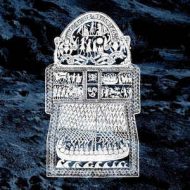 Árstíðir Lífsins brewed just as I like it: two 20 minute episodes of their saga-spinning craft delivered with the conviction and attention to detail you might fairly expect from a band whose work is genre-defining in a field of one. Heljarkviða continues the mighty pagan excesses from the last full-length in 2014. But, even taking that monster of a release into account, this may just be one of the band’s heaviest works to date, albeit an EP. Not surprising given the gloomy subject matter – a walk through the halls of the goddess Hel herself and into the realm of Helheim where you, me and everyone else is very likely to end up unless we, quite literally, decide to go down fighting. Finding comparisons to Árstíðir Lífsins continues to be difficult even after several years at the peak of their game. But inevitably Helrunar is one given the distinctive and varied vocal style of Marsél Dreckmann and the pagan themes. But Árstíðir Lífsins also draws in the broad musical abilities of fellow collaborators Stefán and Carpe Noctem’s Árni. The effect is much more than you might imagine from three individuals. It’s more like a black metal symphony lifted from the Icelandic sagas, consuming all in its path and not wasting one second of playing time to build its vast soundscapes. The fun – if you can call it that – never lets up.
Árstíðir Lífsins brewed just as I like it: two 20 minute episodes of their saga-spinning craft delivered with the conviction and attention to detail you might fairly expect from a band whose work is genre-defining in a field of one. Heljarkviða continues the mighty pagan excesses from the last full-length in 2014. But, even taking that monster of a release into account, this may just be one of the band’s heaviest works to date, albeit an EP. Not surprising given the gloomy subject matter – a walk through the halls of the goddess Hel herself and into the realm of Helheim where you, me and everyone else is very likely to end up unless we, quite literally, decide to go down fighting. Finding comparisons to Árstíðir Lífsins continues to be difficult even after several years at the peak of their game. But inevitably Helrunar is one given the distinctive and varied vocal style of Marsél Dreckmann and the pagan themes. But Árstíðir Lífsins also draws in the broad musical abilities of fellow collaborators Stefán and Carpe Noctem’s Árni. The effect is much more than you might imagine from three individuals. It’s more like a black metal symphony lifted from the Icelandic sagas, consuming all in its path and not wasting one second of playing time to build its vast soundscapes. The fun – if you can call it that – never lets up.
This all begins to make you wonder what’s going on down there in Hel. Everything I’ve read until now (which is confirmed in the accompanying spiel) has led me to believe that it’s a fairly morose place. And yet it has inspired one of the least lugubrious and dour 40 minutes of Árstíðir Lífsins to date. Now just to clarify, this band is very much about the grim and melancholy – drawing its influences from the Nordic Eddas and the Dark Ages. Far more Helheim than Valhalla, really. But this is definitely at the higher tempo higher intensity end of the band’s spectrum with surging riffs, deep choral harmonies (all provided by Dreckmann whose abilities range from an earth shaking bass to chorus lines that border on the ecclesiastic) and the kind of pastoral lows and rousing black metal crescendos which brought me into the Árstíðir Lífsins fold in the first place (and, for that, Moonsorrow also springs to mind). The EP kicks off and we’re treated to the inevitable acoustic intro – storm winds, the foreboding violin and the reverberating vocals issuing forth their prophecy. Then, once you’re completely lost in the world of the ancient Icelandic sagas, the latest of the band’s grand works begins.
After the darkly sumptuous barrage of the first track, the second and final track effortlessly lifts the standard even further both in sheer ferocity and complexity seeming to warp time as it goes. As usual it’s all over before you’re ready. Listening to this band is a little like trying to absorb the vast workings of biological system from within. But Heljarkviða provides a more easily digestible version of those vast visions. This is Árstíðir Lífsins at its finest and, arguably, benefitting from being a 40 minute blast for anyone who finds the standard length of their albums daunting. If you’ve ever thought the idea of combining the ancient world of the Norse with black metal – even if you’ve found yourself disappointed in the past – and have not yet found your calling, then check this out. Árstíðir Lífsins combines intense black metal with bardic tale-telling (if you can understand ancient Nordic languages) and an unmatched knack for creating sprawling atmospheres and a vision of times long past. And if that’s not enough, apparently there is another full-length on the way. In the meantime, if this is anything to go by, 2017 is about to be another vintage year in the world of heathen black metal.
(9/10 Reverend Darkstanley)

Leave a Reply